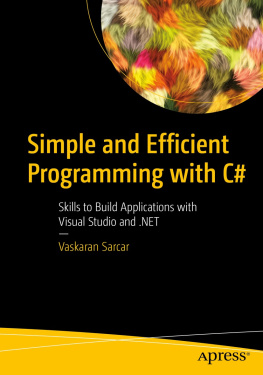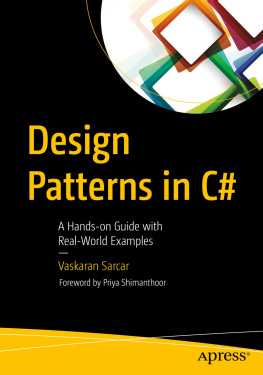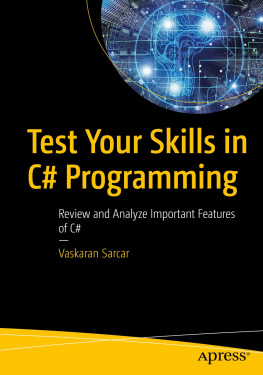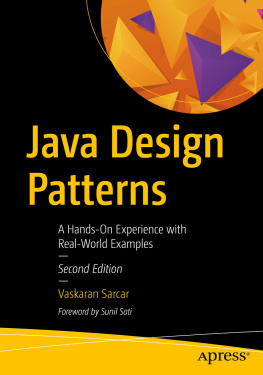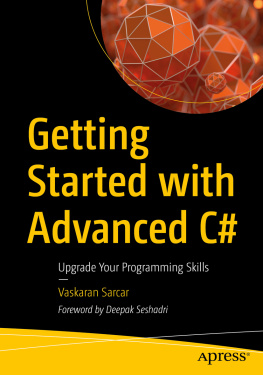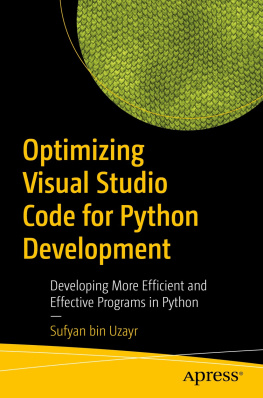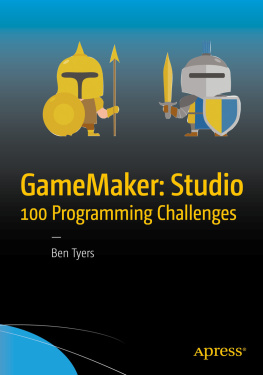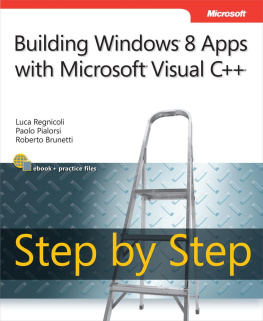Vaskaran Sarcar - Simple and Efficient Programming with C#: Skills to Build Applications with Visual Studio and .NET
Here you can read online Vaskaran Sarcar - Simple and Efficient Programming with C#: Skills to Build Applications with Visual Studio and .NET full text of the book (entire story) in english for free. Download pdf and epub, get meaning, cover and reviews about this ebook. year: 2021, publisher: Apress, genre: Computer. Description of the work, (preface) as well as reviews are available. Best literature library LitArk.com created for fans of good reading and offers a wide selection of genres:
Romance novel
Science fiction
Adventure
Detective
Science
History
Home and family
Prose
Art
Politics
Computer
Non-fiction
Religion
Business
Children
Humor
Choose a favorite category and find really read worthwhile books. Enjoy immersion in the world of imagination, feel the emotions of the characters or learn something new for yourself, make an fascinating discovery.
- Book:Simple and Efficient Programming with C#: Skills to Build Applications with Visual Studio and .NET
- Author:
- Publisher:Apress
- Genre:
- Year:2021
- Rating:4 / 5
- Favourites:Add to favourites
- Your mark:
Simple and Efficient Programming with C#: Skills to Build Applications with Visual Studio and .NET: summary, description and annotation
We offer to read an annotation, description, summary or preface (depends on what the author of the book "Simple and Efficient Programming with C#: Skills to Build Applications with Visual Studio and .NET" wrote himself). If you haven't found the necessary information about the book — write in the comments, we will try to find it.
Each chapter opens with an introduction and original application written in C# 9 for you to jump into coding. From there, you are guided through an expected output and taught best practices along the way. Author Vaskaran Sarcar emphasizes extending and maintaining the same program and he demonstrates examples for different scenarios to make your program more efficient and effective.
This book is divided into four parts. The first part starts with a detailed discussion of polymorphism. It then shows you how to make proper use of abstract classes and interfaces, and you will know which technique to use for a specific scenario. Discussions on code comments teach you how to use them effectively, and why you need to be careful with code comments.
In the second part you will learn six design principles, including SOLID and DRY principles. These are the foundation of well-known design patterns and they establish practices for developing software with considerations for maintaining and extending as a project grows.
The third part takes you through the methods to make efficient applications. You will learn the common use of factories to separate code from its opposite and the alternative of inheritance using object composition and wrappers. This part also demonstrates the use of template methods, hooks, and facades in programming. Hints show you how professional coders develop an enterprise application.
In the fourth and final part you will learn about effective memory management techniques by preventing leaks in your application and the use and misuse of design patterns. This part also discusses how to decide between a static method and an instance method and other techniques, in brief.
After reading this book, you will be able to implement best practices to make your programs more effective and reliable.
What Will You Learn
- Analyze the alternative solutions before implementation by comparing the pros and cons
- Make polymorphic code perform better
- Know the side-effects of bad/redundant comments
- Understand the significance of the SOLID and DRY principles
- Add features using wrappers
- Redefine steps without altering the calling sequence of an algorithm
- Use hooks in your application
- Convert a complex system into a user-friendly system using facades
- Run your application in .NET 6
Who Is This Book For
Developers with a basic knowledge of C#
Vaskaran Sarcar: author's other books
Who wrote Simple and Efficient Programming with C#: Skills to Build Applications with Visual Studio and .NET? Find out the surname, the name of the author of the book and a list of all author's works by series.

